| Srl | Item |
| 1 |
ID:
093545
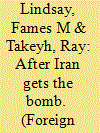

|
|
|
| 2 |
ID:
188126
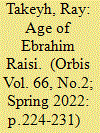

|
|
|
|
|
| Summary/Abstract |
The Islamic Republic of Iran finds itself in an unusual paradox. It is a regime that is growing stronger in the region while weaker at home. The mullahs will stand as Persia’s most dedicated and ardent imperialists, who have implanted their influence throughout the Middle East. Iran has prolonged regional civil wars, harassed Arab potentates, and reduced the once proud Arab nation of Iraq into a vassal state. Yet, it is at home that the regime faces its most significant challenges. Ebrahim Raisi, Iran’s new dogmatic and unimaginative president, is facing a depleted economy, popular protests, and massive corruption. The clerical oligarchs have no answer to Iran’s mounting problems. It remains unclear whether the regime can survive the many predicaments of its own making.
|
|
|
|
|
|
|
|
|
|
|
|
|
|
|
|
| 3 |
ID:
123644
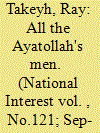

|
|
|
|
|
| Publication |
2012.
|
| Summary/Abstract |
MORE THAN thirty years after Ayatollah Ruhollah Khomeini came to power-and two decades after his passing-the Islamic Republic remains an outlier in international relations. Other non-Western, revolutionary regimes eventually eschewed a rigidly ideological foreign policy and accepted the fundamental legitimacy of the international system. But Iran's leaders have remained committed to Khomeini's worldview. The resilience of Iran's Islamist ideology in the country's foreign policy is striking. China's present-day foreign policy isn't structured according to Mao's thought, nor is Ho Chi Minh the guiding light behind Vietnam's efforts to integrate into the Asian community. But Iran's leadership clings to policies derived largely from Khomeini's ideological vision even when such policies are detrimental to the country's other stated national interests and even when a sizable portion of the ruling elite rejects them.
|
|
|
|
|
|
|
|
|
|
|
|
|
|
|
|
| 4 |
ID:
060275


|
|
|
|
|
| Publication |
Winter 2004-05.
|
|
|
|
|
|
|
|
|
|
|
|
|
|
|
|
| 5 |
ID:
186371


|
|
|
|
|
| Summary/Abstract |
Jimmy Carter is often accused of ‘losing Iran’. It may therefore come as a surprise that no American tried harder to forestall the Iranian Revolution than Carter. The increasing availability of archival evidence reveals that Carter tried to press Shah Mohammad Reza Pahlavi, who was reluctant to act, to restore order. Carter even contemplated a military coup to prevent the assumption of power by revolutionary leader Ayatollah Ruhollah Khomeini. None of this worked, because America’s allies were too fickle and its adversaries too determined. Carter was ultimately guilty not of ‘losing’ Iran, but of misunderstanding it.
|
|
|
|
|
|
|
|
|
|
|
|
|
|
|
|
| 6 |
ID:
109552
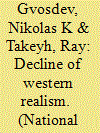

|
|
|
|
|
| Publication |
2012.
|
| Summary/Abstract |
WHEN OPERATION Odyssey Dawn commenced in the skies over Libya on March 19, 2011, it represented a major turnaround in U.S. policy. Only nine months earlier, U.S. ambassador Gene Cretz had characterized the regime as a "strategic ally" of the United States due to Libyan cooperation on counterterrorism and nonproliferation issues (and its halting, tentative steps toward greater openness). Now Libya found itself on the receiving end of conventional U.S. military power for repressing a civilian population agitating for governmental change.
|
|
|
|
|
|
|
|
|
|
|
|
|
|
|
|
| 7 |
ID:
178971


|
|
|
|
|
| Summary/Abstract |
US intelligence services’ assessments of Iran’s political stability in the late 1970s were imperfect but not incompetent.
|
|
|
|
|
|
|
|
|
|
|
|
|
|
|
|
| 8 |
ID:
107582
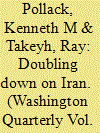

|
|
|
| 9 |
ID:
095444


|
|
|
|
|
| Publication |
Oxford, Oxford University Press, 2009..
|
| Description |
viii, 310 p.
|
| Standard Number |
9780195327847, hbk
|
|
|
|
|
|
|
|
|
|
|
|
Copies: C:1/I:0,R:0,Q:0
Circulation
| Accession# | Call# | Current Location | Status | Policy | Location |
| 054958 | 327.55/TAK 054958 | Main | On Shelf | General | |
|
|
|
|
| 10 |
ID:
121567


|
|
|
|
|
| Publication |
2013.
|
| Summary/Abstract |
SCHOLARS AND specialists often lament that once the United States commits itself to a course of action abroad, it rarely adjusts its path. Bureaucracies prize continuity over innovation and cling to the prevailing orthodoxy. Top officials often embrace positions predetermined by past prejudices and lessons. The gravitational pull of politics induces presidents and secretaries of state to persist with existing policies even when they aren't working. Although such inflexibility may not be particularly harmful in ordinary times, big problems can arise when the United States finds itself in uncharted territory or facing unexpected geopolitical shifts.
|
|
|
|
|
|
|
|
|
|
|
|
|
|
|
|
| 11 |
ID:
051420
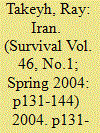

|
|
|
|
|
| Publication |
2004.
|
| Description |
p131-144
|
| Summary/Abstract |
Iran today is on the verge of its most acute crisis since the 1979 revolution, as the political impasse of the past few years is turning to active confrontation between a restive populace and an inflexible theocracy. In contrast to the triumph of reformist candidates in the 2000 elections, which fostered hopes of a democratic breakthrough, the political climate leading up to the February elections reflected the success of the conservative backlash. However, the success of the conservatives' strategy contains the seeds of their own destruction. By obstructing a peaceful reform movement, the hardliners have ensured that the popular clamour for change will escape the confines of conventional politics and assert itself through defiance and protest.
|
|
|
|
|
|
|
|
|
|
|
|
|
|
|
|
| 12 |
ID:
059131


|
|
|
|
|
| Publication |
2004.
|
| Description |
p51-64
|
|
|
|
|
|
|
|
|
|
|
|
|
|
|
|
| 13 |
ID:
181721
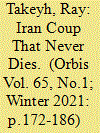

|
|
|
|
|
| Summary/Abstract |
The 1953 coup in Iran that toppled the nationalist Prime Minister Mohammad Mossadeq stands as one of the most controversial episodes of the Cold War. It is often referred to as the original sin where U.S. meddling poisoned relations between the two sides and even made the Islamist revolution of 1979 possible. But recent evidence suggests that America's role in the coup was a minor one and the key actors determining the course of events were the Iranians themselves. It was Iranian generals, clerics and everyday citizens who put an end to Mossadeq's premiership. All the Western lamentations aside, this was very much an Iranian affair.
|
|
|
|
|
|
|
|
|
|
|
|
|
|
|
|
| 14 |
ID:
097882


|
|
|
| 15 |
ID:
081976
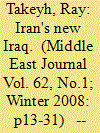

|
|
|
|
|
| Publication |
2008.
|
| Summary/Abstract |
The US invasion of Iraq has revolutionized the strategic architecture of the Persian Gulf in a manner that is still difficult to fully appreciate. Among the relationships that have been dramatically altered by America's move are the ties between Iran and Iraq. A critical examination reveals that more than territorial disputes or contending hegemonic aspirations, it was ideology that caused tension and ultimately war between these two states from 1980-88
|
|
|
|
|
|
|
|
|
|
|
|
|
|
|
|
| 16 |
ID:
078136


|
|
|
| 17 |
ID:
081334


|
|
|
| 18 |
ID:
068824


|
|
|
| 19 |
ID:
130471
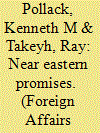

|
|
|
|
|
| Publication |
2014.
|
| Summary/Abstract |
Contrary to popular myths and conspiracy theories about Washington's desire to control the Middle East, for the past six decades, U.S. policymakers have usually sought to minimize the United States' involvement there. But the high-stakes nature of American interests in the region -- particularly oil -- and the complexity of the Middle East's problems always seem to draw the United States back in. In spite of himself, U.S. President Dwight Eisenhower was sucked into the Suez crisis in 1956 and the pan-Arabist revolts of the late 1950s. Lyndon Johnson barely lifted a finger to prevent the Six-Day War in 1967. Richard Nixon found himself grudgingly drawn into the region by the 1973 Arab-Israeli war and the superpower nuclear crisis it caused. Despite his aggressive image, Ronald Reagan did little in response to repeated attacks in Lebanon and the Persian Gulf by Iran and its proxies. George H. W. Bush came to office hoping to ignore Saddam Hussein, not to go to war with him. And although it is rarely remembered today, George W. Bush was not particularly interested in the Middle East and paid little attention to the region prior to the 9/11 attacks.
|
|
|
|
|
|
|
|
|
|
|
|
|
|
|
|
| 20 |
ID:
181612


|
|
|
|
|
| Summary/Abstract |
Predictions that Russia or China would take the lead in the fight against the pandemic have not panned out. Instead, countries around the world are clamoring for forging new trade, technological, and health alliances with the United States.
|
|
|
|
|
|
|
|
|
|
|
|
|
|
|
|